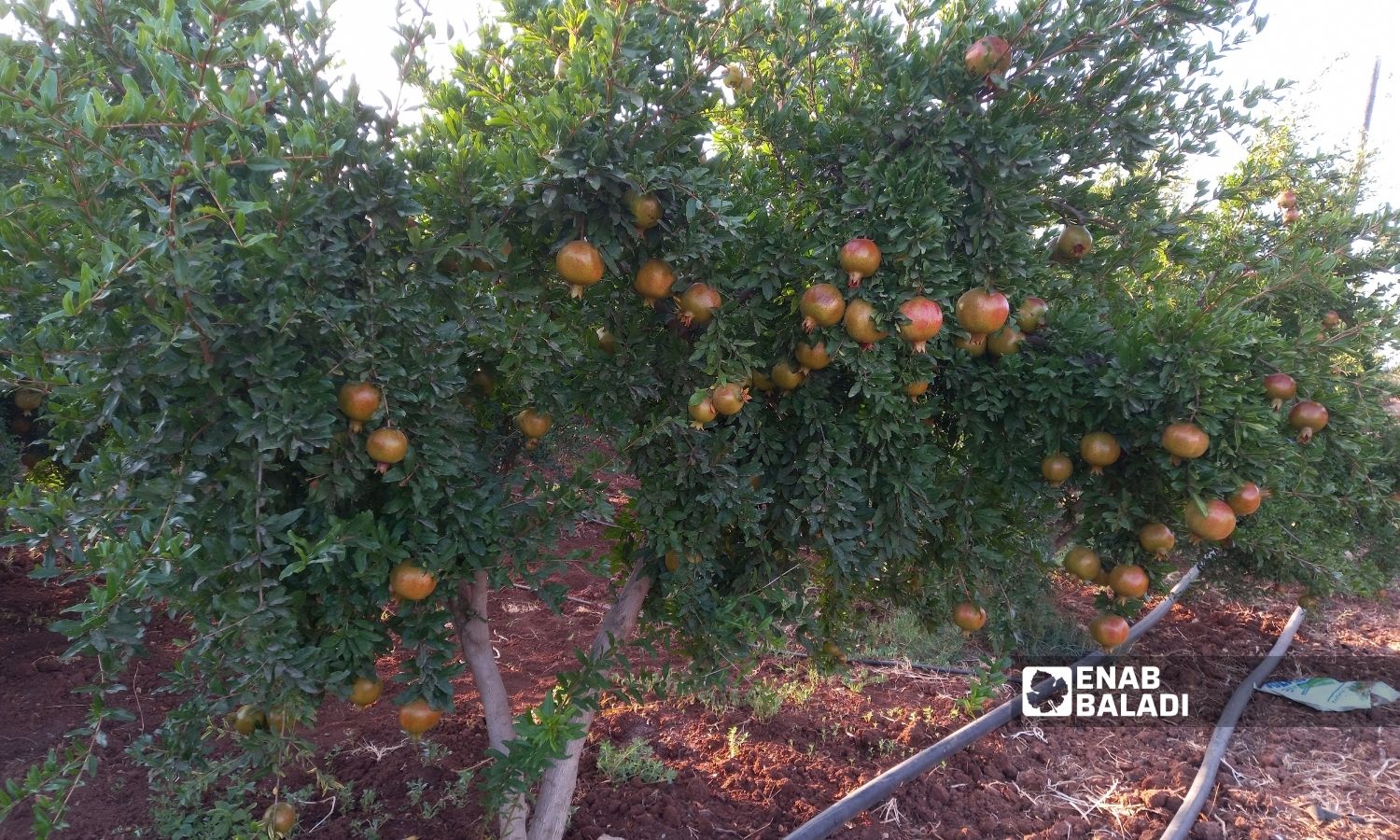



Enab Baladi – Halim Muhammad
In an attempt to save as much as possible from the costs that naturally affect the size of the profits, the farmers who own the pomegranate crop in Daraa tend to sell it to the merchants directly.
The merchants store part of the crop in refrigerators in addition to offering another part to the local market or exporting it.
This commercial process is accompanied by a sharp decline in the value of the local currency, during which its price reached about five thousand Syrian pounds against one dollar, which means greater costs for farmers, given that many of them buy or borrow agricultural supplies and medicines of all kinds, estimated in US dollars.
Nabil, 35, owns a pomegranate farm that extends over an area of 10 dunums (about 9000 m2) in the western countryside of Daraa. He preferred to sell the crop directly to the merchant from the land before harvesting.
He told Enab Baladi that the high cost of harvesting the crop prompted him to sell it to the merchant instead of putting it in the al-Hal market (the main vegetable and fruit market), pointing out at the same time that production costs have increased over the past few years.
Plastic baskets, labor, transportation fees, and agricultural requirements of all kinds are pricey necessities, and their prices put farmers at a loss to choose between the most economical, given that the price of a plastic box is 7,000 SYP (about 1.5 USD).
In addition, the daily wage of a worker during the harvest season is about 15,000 pounds, while the cost of transporting the crop by vehicle from Daraa to the market in Damascus reaches 600,000 pounds (over 120 USD).
On the possibility of storing the crop as an alternative solution to direct selling to the merchant, Nabil pointed out the absence of the financial capabilities that would allow him to carry out such a step in light of the high fuel prices.
The price of diesel in the local market reached 6500 SYP per liter, followed by the cost of renting a cooling unit, in addition to paying the harvesting cost for labor.
The 55-year-old Abdul Karim, who refused to use his full name for security reasons, also spoke to Enab Baladi about the high costs, which in turn affect the economic viability of pomegranate growers.
The farmer, who owns a 15-dunum pomegranate orchard, said that the cost of one kilogram when it reaches the market reaches 500 pounds, and this reinforces the farmer’s desire to sell the crop to the merchant to avoid brokering.
He pointed out that the deterioration of the value of the Syrian pound is causing money loss, which prompts farmers to fix the value of “selling the crop before harvest” in the US dollar in order to avoid losses.
Farmers borrow what they need from agricultural pharmacies (medicines and fertilizers) to be paid for at a later time after selling the crop, but agricultural engineers fix the prices of these materials in dollars based on the black market exchange rate.
The value of fertilizers and medicines that Nabil needs for his land amounts to nearly 1000 USD, which he pays after the end of the season.
According to Abu Ahmed, an agricultural engineer and owner of an agricultural pharmacy in Daraa, it is better for the farmer to fix the value of the agricultural supplies he borrows in dollars, which makes the sale process also safer for the seller, given that he buys them on the basis of the dollar exchange rate, and any decrease in the value of the local currency will expose him to loss.
The rise in fertilizer prices is pushing farmers to limit their use during the current year, which negatively affects the quality of the agricultural product compared to previous years, according to Ahmed (a farmer who owns 20 dunums of pomegranates).
Ahmed added that the owners of agricultural pharmacies have become “partners in the farmers’ profits,” in reference to the high prices of agricultural medicines and fertilizers.
Pomegranate cultivation witnessed a noticeable demand in Daraa during the last decade, following the decline in grape cultivation, given that pomegranate consumes less water and is more resistant to disease at the same time.
The French type is considered the most abundant type of pomegranate in Daraa. It is a thick-skinned type that can be stored in refrigerators.
Daraa exports part of the crop to the Arab Gulf region and neighboring countries, but the process declined during the early years of the revolution.
The Directorate of Agriculture in Daraa had estimated the current season’s production at about 15,250 tons of pomegranate, and the area planted with pomegranate is 1,021 hectares, comprising 445,000 trees in the production stage.
The tree’s production ranges between 30 and 40 kilograms, the head of the plant production department in the Daraa Agriculture Directorate, Wael al-Ahmad, told the state-run news agency (SANA) on 20 July.
According to the medical website healthline, pomegranate is one of the fruits rich in calories, protein, fats, sugar, fiber, minerals, and vitamins.
It also contains antioxidants, helps prevent inflammation, has anti-cancer properties, promotes heart and urinary tract health, and improves endurance.
if you think the article contain wrong information or you have additional details Send Correction